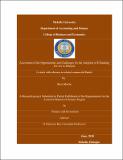| dc.description.abstract | Despite the growth of e-banking adoption worldwide, Ethiopian banks continue to conduct most
of their banking transactions using traditional methods. The general objective of the study was
assessment of the current extent and practices, benefits realized by banks, driving forces,
opportunities and challenges for the adoption of e-banking service in Ethiopia. From this general
objective, five specific issues were explored. An exploratory research design was employed to
conduct this study. Both primary and secondary qualitative data were collected for the purpose of
this study from the IT manager’s of each bank at the head office level and bank web sites
respectively. The collected data was analyzed by using descriptive analysis such as tables and
percentages.
From an analysis of the collected data, the findings revealed that: balance inquiry, cash
withdrawal, funds transfers, statement printing are among the major practice of e-banking
among those banks that are providing the service to the customer. The different e-banking
channels by which banks are using to provide these services to the customer are ATM card, debit
card, credit card, salary card, visa card, master card, Internet banking and Mobile or SMS
banking. Cost reduction, coverage of wide geographical area, customer satisfactions etc are
among the benefits of adopting the system from the viewpoint of the bank. Among the different
driving forces that initiate banks to adopt e-banking services: existence of high competition in the
banking industry, desire to improve organizational performance, desire to reduce transaction
cost, desire to cover wide geographical area, and desire to build organizational reputation are
among others. Chances of risk, Lack of suitable legal and regulatory framework, absence of
financial networks that links different banks, Low level of internet penetration and poorly
developed telecommunication infrastructure, high cost of internet, security concerns are among
the major challenges for the adoption of e-banking service in the country. However, late adopter
opportunities, improvement in the banking habit of the society, commitment of the government to
facilitate the expansion of ICT infrastructure and willingness among banks to cooperate in
building infrastructure are the major opportunities for the adoption of the system in the banking
industry. | en_GB |


